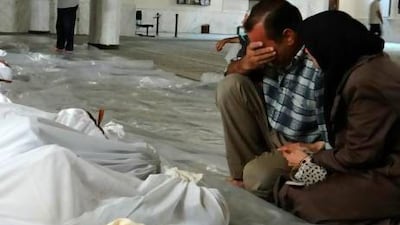The United Nations Security Council reaffirmed its opposition to chemical weapons on Friday in the face of high-profile instances of their use worldwide.
The 15-member body unanimously passed a declaration proposed by Britain expressing support for the Convention on the Prohibition of the Development, Production, Stockpiling and Use of Chemical Weapons.
"The Security Council expresses its strong conviction that those responsible for the use of chemical weapons should be held accountable," it said in a statement following the declaration.
Yet the Security Council has in recent years seen squabbles between western powers and Russia over the use of chemical weapons in the Syrian civil war, with Moscow scuppering attempts to hold Damascus to account.
The OPCW voted in June 2018 over Russian objections to identify perpetrators of chemical attacks after Russia used its Security Council veto to terminate the mandate of the UN-OPCW team that accused Syria of using chlorine gas and ISIS extremists of using mustard gas.
Meanwhile in 2017, North Korean leader Kim Jong Un's estranged half-brother died after having his face smeared with the outlawed VX nerve agent at Kuala Lumpur International Airport.
The UN was also divided over its response to the nerve agent poisoning of former Russian spy Sergei Skripal and his daughter Yulia with a Soviet-era nerve agent in the English city of Salisbury in March last year.
In its Friday resolution, the Security Council urged countries to ratify the Convention on the Prohibition of the Development, Production, Stockpiling and Use of Chemical Weapons and on their Destruction.
The 1993 convention came into force in 1997. North Korea, Egypt and South Sudan have not signed it, while Israel has signed but not ratified the pact.
The statement made no mention of the contentious issue of attribution for chemical attacks, but it does support strong compliance with the convention.

